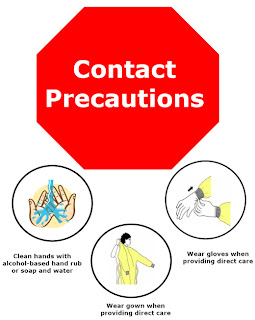An ongoing infection prevention controversy is the concern about adverse consequence from contact (isolation) precautions.
Contact precautions are employed to reduce the transmission of drug resistant pathogens such as MRSA and VRE.
Recently published in the Journal of Hospital Infection, a retrospective cohort study of patients admitted to a tertiary care medical center over two years assessed the relationship between contact precautions and depression and anxiety. During the study period, there were 70,275 admissions including 28,564 unique non-intensive-care-unit (ICU), non-psychiatric admissions.
The result? After adjusting for potential confounders, contact precautions were associated with depression [odds ratio (OR) 1.4, 95% confidence interval (CI) 1.2–1.5] but not with anxiety (OR 0.8, 95% CI 0.7–1.1) in the non-ICU population. Thus, depression was 40% more prevalent among general inpatients on contact precautions.
Contact precautions are not without adverse consequences. It makes me wonder if alternative measures such as excellent hand hygiene, bare below the elbows inpatient HCW attire, and universal gloving could be successfully employed in lieu of isolation precautions.
Contact precautions are employed to reduce the transmission of drug resistant pathogens such as MRSA and VRE.
Recently published in the Journal of Hospital Infection, a retrospective cohort study of patients admitted to a tertiary care medical center over two years assessed the relationship between contact precautions and depression and anxiety. During the study period, there were 70,275 admissions including 28,564 unique non-intensive-care-unit (ICU), non-psychiatric admissions.
The result? After adjusting for potential confounders, contact precautions were associated with depression [odds ratio (OR) 1.4, 95% confidence interval (CI) 1.2–1.5] but not with anxiety (OR 0.8, 95% CI 0.7–1.1) in the non-ICU population. Thus, depression was 40% more prevalent among general inpatients on contact precautions.
Contact precautions are not without adverse consequences. It makes me wonder if alternative measures such as excellent hand hygiene, bare below the elbows inpatient HCW attire, and universal gloving could be successfully employed in lieu of isolation precautions.
